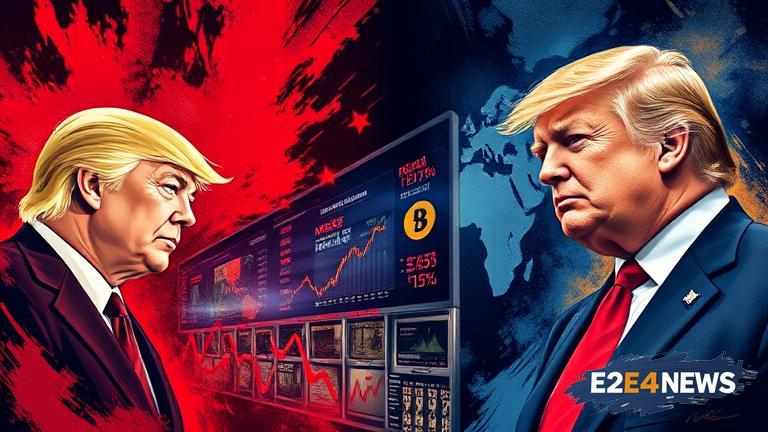The escalating tensions between US President Donald Trump and the Federal Reserve have sent shockwaves through global markets, causing a significant downturn in stocks and currencies. The Straits Times Index (STI) in Singapore was not immune to the fallout, plummeting 0.3% as investors grew increasingly wary of the situation. The feud between Trump and the Fed has been ongoing for some time, with the President repeatedly criticizing the central bank’s monetary policy decisions. Trump has accused the Fed of not doing enough to support the US economy, while the Fed has maintained that its decisions are based on data-driven analysis. The situation took a turn for the worse when Trump tweeted that the Fed was ‘out of touch’ and that its policies were ‘hurting’ the US economy. The tweet sparked a sharp decline in US stocks, with the Dow Jones Industrial Average falling over 200 points. The decline was mirrored in other global markets, including Asia and Europe. The STI’s decline was led by losses in the banking and finance sectors, with DBS Group Holdings and Oversea-Chinese Banking Corp (OCBC) among the biggest losers. The decline in the STI was also attributed to a decline in investor sentiment, with many investors opting to stay on the sidelines until the situation clarifies. The tensions between Trump and the Fed have also sparked concerns about the potential impact on the global economy. Some analysts have warned that a prolonged feud could lead to a decline in business confidence and investment, ultimately affecting economic growth. Others have pointed out that the situation could also lead to a decline in the value of the US dollar, making imports more expensive and potentially leading to higher inflation. The situation has also sparked a debate about the independence of the Fed, with some arguing that the central bank should be free from political interference. The Fed has maintained that its decisions are based on its dual mandate of maximum employment and price stability, and that it will not be swayed by political pressure. Despite the tensions, some analysts have pointed out that the US economy remains strong, with low unemployment and steady growth. However, others have warned that the situation could still have a significant impact on the global economy, particularly if it leads to a decline in trade and investment. The situation is being closely watched by investors and policymakers around the world, with many waiting to see how the situation will unfold. In the meantime, investors are advised to remain cautious and to keep a close eye on developments. The decline in the STI is a reminder that global markets are highly interconnected, and that events in one part of the world can have a significant impact on others. As the situation continues to unfold, it remains to be seen how the feud between Trump and the Fed will ultimately play out. One thing is certain, however: the situation will be closely watched by investors and policymakers around the world, and will have significant implications for the global economy. The US-China trade war has also added to the uncertainty, with some analysts warning that a prolonged trade war could lead to a decline in global trade and economic growth. The situation is complex and multifaceted, and will require careful monitoring and analysis in the coming days and weeks. For now, investors are advised to remain cautious and to keep a close eye on developments. The situation is a reminder that global markets are highly volatile, and that events can change quickly. As such, it is essential to stay informed and to be prepared for any eventuality.
